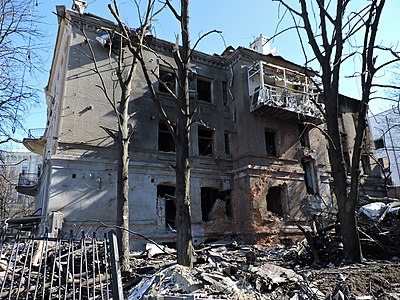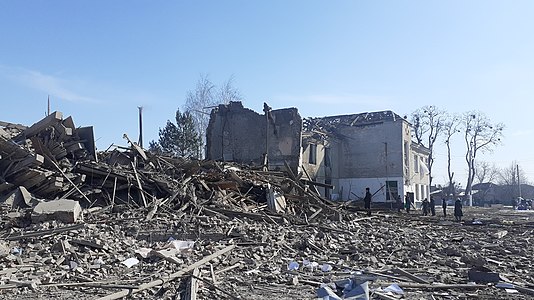Countering Russian aggression with a camera

On Thursday, February 24th, Serhii Petrov woke up at 5am from the sounds of explosions. His native Kharkiv, the second largest city in Ukraine located 40 kilometres (25 mi) from the Ukrainian-Russian border, was attacked by Russian troops – along with many other regions of Ukraine. Within days, Serhii lost his job and his home. Still, he remains in Kharkiv – which is under Ukrainian control but is heavily shelled by the invading forces – to document the humanitarian consequences of Russian military aggression, including for Wikipedia.
Serhii is a longtime Wikipedia editor, known as User:Kharkivian. He has been an active Wikipedia editor for over a decade now and has created hundreds of articles, including many about his native Kharkiv region. Serhii is also a community leader in his region, having organized multiple training events and Wikipedia campaigns such as the WikiKharkivshchyna contest for libraries and other article & photo contests. Besides, he is a civic activist; Serhii was one of the leaders of the 2013–2014 Euromaidan protests in Kharkiv.
Before the war, Serhii’s day job was working as a content manager at a small company. However, many businesses stopped operating when the full-scale Russian invasion began – and Serhii lost his job. A few days later, he was forced to relocate from his home after his neighborhood came after heavy shelling by Russian troops in early March. His home was a few kilometers from the frontline. There was no heating and no power, and fires started breaking out in his neighborhood. Serhii firmly decided not to evacuate from Kharkiv and remain in the city, but now he has to stay at a colleague’s place in a safer neighborhood.
Now, Serhii’s main work is documenting the impacts of Russian aggression, particularly the war crimes committed by the invaders. As in other parts of Ukraine, Russia bombs civilian areas – Kharkiv authorities say over 1100 buildings were destroyed by Russian shelling, including 1000 residential homes. Serhii takes photos and videos of the destruction’s aftermath so Ukraine can one day hold the aggressors accountable in the international system of justice.
-
Destroyed apartment building in Kharkiv after Russian shelling
-
Destroyed apartment building 3 Kholodnohirska Street, Kharkiv
-
Destroyed house 25 Chernyshevska Street
-
Destroyed School 6 in Merefa after Russian rocket strike
Serhii is doing this work both as a journalist and helping Ukrainian law enforcement agencies. He is also writing daily chronicles of the attack on Kharkiv, which are being translated by volunteers into other languages ( see an example in English).
After taking the photos and videos, Serhii uploaded some of them to Wikimedia Commons. He can’t upload some others for safety reasons, but still the evidence of Russian war crimes is plenty. So far, as of March 23rd, Serhii has uploaded around three dozen media files – but many more are to come. Serhii is planning to continue doing this work until the war ends, whenever this day comes. Apart from uploading photos and videos, Serhii is doing technical work on Commons like categorization. He was also a trainer at a recent webinar for volunteers held by Wikimedia Ukraine, and he is working with state agencies to freely license their photos so they can be uploaded to Wikipedia as well.
-
Destroyed apartment building 177 Krasnodarska Street
While documenting the impact of the war, Serhii once came under Russian shelling, but he remained intact and not deterred. Serhii calls this work his way to counter Russian aggression – one person may be most effective when defending the homeland with arms, while another may be most useful with a camera in their hands.








Discuss this story